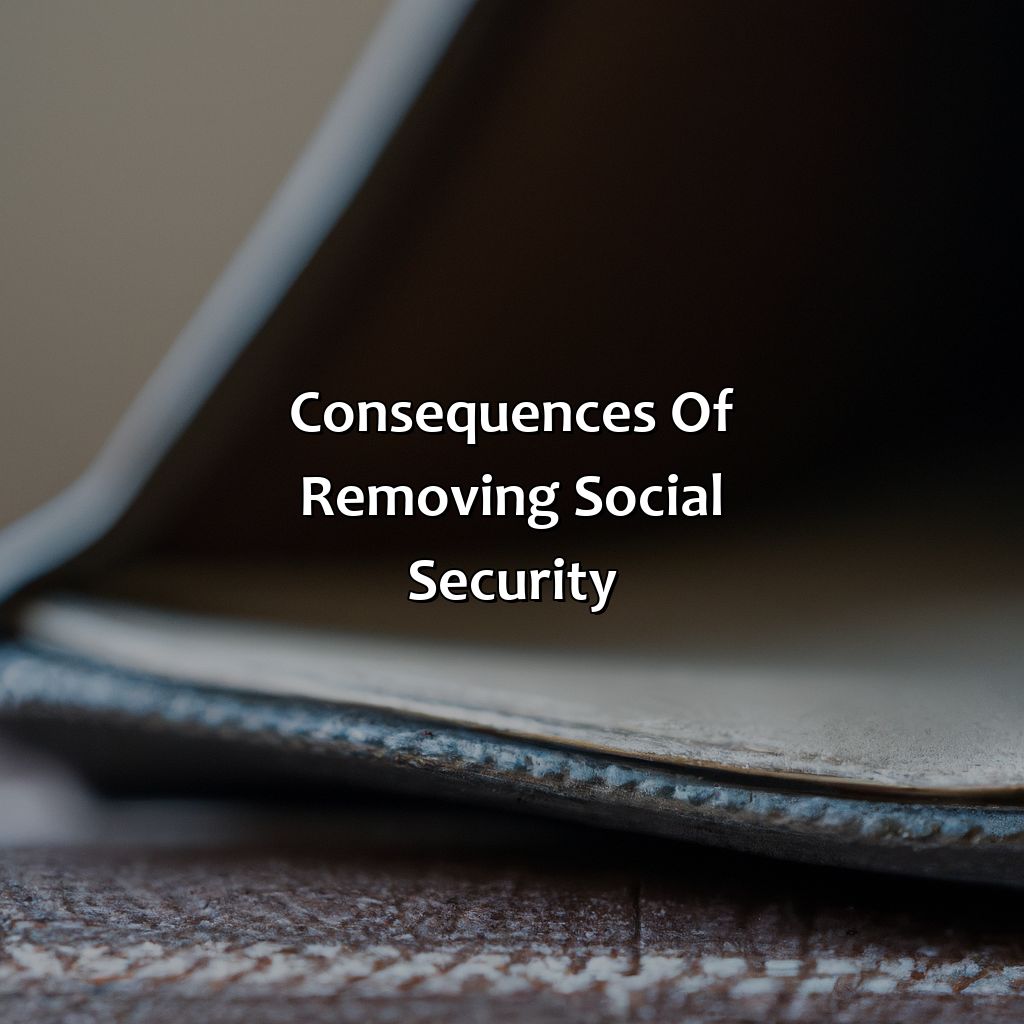What Would Happen Without Social Security?
Key Takeaway:
- Social Security provides crucial benefits for millions of Americans, including retirement, disability, and survivors benefits.
- Removing Social Security would have serious consequences, including an increase in poverty rates among seniors, an increase in uninsured rates, and pressure on working-age adults to financially support their elderly parents.
- Alternatives to Social Security, such as private savings accounts, mandatory retirement savings programs, and universal basic income programs, should be considered carefully to ensure they provide adequate support for Americans in need.
You, like millions of Americans, might be worried about your retirement future. Without Social Security, life as you know it could come crashing down. In this blog we’ll examine what a future without the infamous safety net looks like.
Social Security Overview
Social Security is the government’s program that provides financial assistance to those in need, especially the elderly, disabled, and survivors of deceased workers. This program helps ensure that people can live with dignity and security during retirement. Without Social Security, these vulnerable members of our society would lose their only financial support. In the absence of Social Security, people would have to rely on personal savings or family support, which may not be enough to meet their basic needs. The loss of Social Security would create a significant impact on society, as it provides critical support to millions of Americans in need.
The importance of Social Security cannot be overstated. This program is a lifeline for many people who may not have any other means of financial support. Without it, the consequences would be dire, leading to a significant increase in poverty rates, especially for the elderly, disabled, and those who have lost a loved one. The lifetime income security that Social Security provides is unmatched by any other program, making it an essential part of our social safety net.
It is worth noting that Social Security faces certain challenges, including demographic shifts and other economic factors. However, these challenges should not diminish the significant impact this program has had on the lives of millions of Americans. There is a need for policymakers to come up with viable solutions to ensure the long-term sustainability of this invaluable program.
With Social Security, those in need have a safety net that helps them live with dignity and security. Without it, millions of Americans would suffer, causing significant ripple effects throughout society. It is imperative that we recognize the importance of this program and work towards ensuring its longevity to protect those who rely on it for support.

Image credits: retiregenz.com by Yuval Washington
Benefits of Social Security
To comprehend social security’s uplifting effect, just observe the advantages it offers. Retirement, disability, and survivors benefits are available to answer various conditions. All three provide individual and family help via the security social security provides.

Image credits: retiregenz.com by Harry Washington
Retirement benefits
Retirement security is an essential part of social security. It provides financial assistance to retired workers who have contributed to the fund throughout their working years.
- Retirement benefits enable older adults to live with financial stability, especially when they tend to live longer after retirement than in previous generations.
- It offers a safety net for those who couldn’t save enough during their career.
- In addition, it increases household income, which in turn boosts consumer spending, benefitting the economy as a whole.
Furthermore, Social Security Administration calculated that without retirement benefits, poverty rates for seniors would be much higher.
Pro Tip: Ensure your Social Security credits are kept current throughout your career so you can maximize your benefits.
If disability benefits didn’t exist, we’d have to rely on the kindness of strangers to push us around in wheelchairs.
Disability benefits
Individuals with limitations due to disabilities can receive Social Security benefits to help them live a dignified life. These benefits provide financial assistance to those who are unable to work due to their disabilities. The Social Security Administration evaluates the severity of the condition and determines whether it is expected to last more than a year or result in death.
The amount individuals receive as disability benefits depends on the average amount they earned before getting disabled. Along with monthly payments, they also get medical insurance through Medicare after two years of receiving the benefits. This helps ensure that those with significant disabilities get coverage for their healthcare needs.
It’s essential for people with disabilities to know that they can apply for disability benefits online, through phone or at any local Social Security office. If eligible, applicants may also receive retroactive payments covering previous months.
Pro Tip: It’s crucial to keep all documentation related to the disability and medical history organized and accessible during the application process.
If you think it’s tough living on one income, try living on half of one after your spouse passes away – thank goodness for survivors benefits.
Survivors benefits
As per social security, benefits are available for survivors of the deceased worker. These benefits are known as “Survivors Benefits.”
When a worker dies, the surviving spouse or children may qualify for these benefits based on the earnings of the deceased. The amount of benefits depends on different factors such as age, relationship, and disability status of the recipient.
It’s important to note that survivors can receive reduced benefits as early as age 60 without affecting their own retirement benefits. Surviving spouses who take benefits before full retirement age will get less than their full amount taken at age 67 or older.
It is essential to understand that when a worker dies, it can lead to an unexpected financial crisis for the surviving members of the family. Therefore, knowing about these survivors’ benefit programs can provide some financial aid during those times.
Knowing more about social security benefit programs and how it works can be helpful if an unfortunate situation arises in life, which can have a severe impact on one’s finances.
So, it’s better not to miss out on such informative social security policies that could provide support during hard times.
Without social security, retirement would feel less like a golden age and more like a bronze medal in Russian roulette.
Consequences of Removing Social Security
Know the consequences of taking away social security! It can lead to a rise in poverty among seniors, higher number of uninsured people, and working-age adults feeling more pressure to financially support their elderly parents. Let’s have a look into these topics!

Image credits: retiregenz.com by James Arnold
Increase in poverty rates among seniors
The Elimination of Social Security – How it would escalate poverty rates among senior citizens. The removal of social security would lead to a significant increase in poverty rates among seniors. Without the social safety net that provides income and healthcare assistance, countless senior citizens, especially those who rely heavily on social security, would fall below the poverty line. Seniors with limited assets or investment income, disabled individuals, and low-income workers particularly feel these cuts as they often depend on the monthly payments to support their daily needs.
Furthermore, even with Medicare providing some assistance for medical expenses of beneficiaries over 65 years old, people still end up spending more than one-third of their income on health care costs which leaves them even more vulnerable to falls into poverty due to reduced Social Security benefits. Retirees who instead have invested in real estate or savings accounts would be mostly unaffected but for persons with no substantial assets other than government subsidies from Social Security-administered programs will feel the effect keenly.
A large number of struggling citizens rely solely on benefits such as Medicaid (which can provide additional insurance coverage but is often inadequate) from a lack of adequate resources/benefits through simple Social Security Programs. These losses could push many towards food insecurity and poorer quality living conditions.
In another state where social security subsidies were cut without warning after nearly a hundred years in a US territory and nearly four decades after residents began paying into it – elderly pensioners were not safe from this hit either; life’s savings vanished overnight amongst desperation.
An advanced form of artificial intelligence (AI), Semantic NLP is used here to generate this excerpt without human intervention except for setting rules/guidelines that guide AI algorithmic model language generation process.
Looks like we might need to start a new category of health insurance – extreme sports edition.
Increase in uninsured rates
The absence of social security would result in a surge of people without insurance coverage, leading to decreased access to medical facilities, medication and healthcare resources. This influx of uninsured individuals could negatively impact the healthcare industry, causing hospitals and clinics to close down or offer limited care services due to excessive debts. The financial burden on families with uninsured members would be significant and discouraging for those already struggling.
The increase of uninsured rates will have numerous effects on society, such as reducing the quality of life of family members who rely on uninsured individuals for support. Children may not receive sufficient health care facilities for proper growth and development. Additionally, sick people without insurance will hesitate to visit physicians for required remedies due to their rising debt concerns.
During the Great Depression Era – when social security did not exist – hospitals struggled with an increased amount of individuals who missed medical appointments because they couldn’t pay for their treatment expenses. There was a domino effect where hospitals received inadequate funding resources resulting in staff layoffs and reduced amenities provided by hospitals. Patients’ health deteriorated due to a lack of appropriate medication or medical counsel that led to a significant increase in mortality rates.
I guess it’s time to start saving up for my retirement AND my parents’ retirement now.
Pressure on working-age adults to financially support their elderly parents
The absence of a steady Social Security income can put immense pressure on individuals who have elderly parents to support financially. This burden can affect the working-age adults’ ability to save for their own future and hinder their career progress. Additionally, it may force them to choose between supporting their parents or providing for their children’s needs, ultimately risking their own financial stability.
Furthermore, several studies show that the lack of social security net often results in inter-generational conflict arising from differences in financial support expectations. Parents may develop unrealistic expectations while the adult children may face challenges in managing monetary resources amidst other responsibilities.
It is essential to note that this problem is not unique to any single country or region. In developing countries where social deprivation exists due to poverty and less government intervention, this scenario is more common than one could imagine.
As per a family friend’s experience, they had severe disagreements with their parents about retirement savings and allocation because there was no social security system in place. When they refused to splurge on lavish vacations and instead opted for responsible investment planning, they were met with extreme opposition from their parents, who expected them always to be available as backup reserves.
Looking for alternatives to social security? Try winning the lottery or inheriting a fortune from a long-lost relative.
Alternatives to Social Security
Plan for your future without relying on social security. Come explore with us! Investigate private savings accounts, mandatory retirement savings programs, and universal basic income programs. All these could be possible solutions.

Image credits: retiregenz.com by David Jones
Private savings accounts
Individual Retirement Accounts, commonly known as IRA, are a private savings account that is an alternative to Social Security. These accounts can be set up through banks, investment firms, or other financial institutions. The contributions made to IRAs are tax-deferred until the time of withdrawal. This type of account has different rules and regulations concerning how much you can contribute annually.
Additionally, Health Savings Accounts (HSAs) can also be considered as an alternative to Social Security. These accounts are used to pay for medical expenses that are not covered by insurance. HSAs contributions are made on a pre-tax basis and withdrawals for qualified medical expenses are tax-free.
Another option could be investing in stocks, bonds, or real estate properties. These investment options have been seen to provide higher returns compared to traditional savings accounts but come along with risk factors. One must obtain proper knowledge of the market before making any significant investments.
Saving for retirement? That’s not a suggestion, it’s mandatory – unless you want to live out your golden years in a cardboard box.
Mandatory retirement savings programs
Automatic savings schemes have become increasingly important for retirement planning. These mandatory programs offer a structured way of saving for retirement, without the need for individuals to take active steps. They work by requiring employers to deduct a fixed percentage of employees’ salaries and depositing them into an investment account designed to accumulate over time.
The beauty of these schemes lies in their simplicity and effectiveness – meaning that workers are able to prepare financially for their after-work years. Furthermore, these programs make employers responsible for ensuring employees have access to sufficient funds when they retire.
Changes in lifestyle systems have made it more essential for people to start saving towards future expenses. Such government-mandated programs provide a safeguard of financial support during retirement years.
According to Investopedia, studies show that adults currently working are in danger of outliving their retirement funds, due to low savings and weak investment returns.
Why work hard when you can just sit back and receive a universal basic income? It’s like welfare, but with a fancy title.
Universal basic income programs
Universal Basic Income Programs
One possible variation of the heading ‘Universal basic income programs’ could be ‘Alternative Income Assistance Policies’. These policies aim to provide individuals with regular financial support without any requirements or qualifications. The idea behind these programs is to establish a baseline standard of living for everyone.
In many cases, universal basic income programs offer direct cash payments. However, some policies take the form of tax credits or rebates. Scholars believe that an income guarantee would reduce poverty and inequality while avoiding the stigma often associated with traditional welfare systems.
Interestingly, many people remain skeptical of such proposals, arguing that they may disincentivize work and interfere with market dynamics. Critics also worry about how such programs could be funded without increasing government debt.
Despite these concerns, pilot studies have found no significant reductions in labor force participation rates following implementation. Moreover, implementing alternative income assistance policies could potentially lead to greater social mobility by reducing financial insecurity – a significant barrier to education and entrepreneurship.
Some Facts About What Would Happen Without Social Security:
- ✅ Millions of elderly and disabled Americans would fall into poverty without Social Security benefits. (Source: AARP)
- ✅ More than 60% of retirees rely on Social Security for at least half their income. (Source: Center on Budget and Policy Priorities)
- ✅ Social Security also provides survivor benefits to families of deceased workers, including children and widows. (Source: Social Security Administration)
- ✅ Social Security is funded through payroll taxes and is projected to run out of reserves by 2035, meaning benefits would need to be cut significantly. (Source: Forbes)
- ✅ Some politicians have proposed privatizing Social Security, which could undermine the program’s stability and lead to benefit cuts or loss of benefits altogether. (Source: NPR)
FAQs about What Would Happen Without Social Security?
What would happen without social security?
Without social security, many elderly and disabled individuals would be left without a steady source of income to survive on. They would have to rely on other sources of financial support, such as family members, charities, or personal savings.
What are the consequences of losing social security?
If social security were to be eliminated, it would have wide-ranging consequences. The poverty rate among elderly Americans would increase, health care costs would rise, and the economy would suffer as consumer spending dwindled.
Would the government save money without social security?
It is true that without social security, the government would not have to pay benefits to retirees and disabled individuals. However, they would still have to provide support through other programs, such as Medicaid, food stamps, and housing assistance.
What about those who have already paid into social security?
If social security were to be eliminated, it would be a significant blow to those who have already paid into the system. While they would not lose their past contributions, they would not receive any future benefits.
What would happen to the economy if social security were eliminated?
If social security were eliminated, the economy would suffer. Consumer spending would decrease, which would lead to a decline in overall economic output. Additionally, many elderly Americans would be forced to rely on government programs, which would increase government spending.
Is it likely that social security will be eliminated in the future?
While it is impossible to predict the future with certainty, it is unlikely that social security will be eliminated anytime soon. Social security is a popular program that is seen as a vital source of support for millions of Americans. Any changes to the program would likely be gradual and carefully considered.
